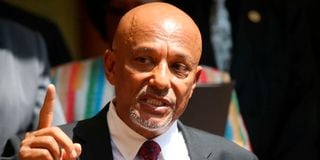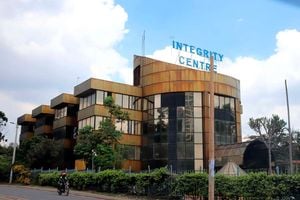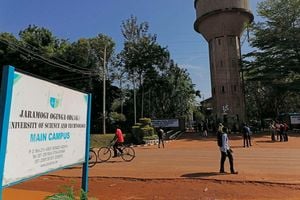
Outgoing Ethics and Anti-Corruption Chief Executive Officer Twalib Mbarak.
The rampant use of fake academic certificates in public service and impunity are some of Kenya’s biggest challenges, outgoing Ethics and Anti-Corruption (EACC) Chief Executive Officer Twalib Mbarak has said.
As the head of the anti-corruption outfit, he revealed that public service has the largest number of personnel with fake academic documents whose removal is a daunting task because they are backed by both senior public servants and sometimes political godfathers.
“What we have observed over a long period of time is the rampant use of false academic documents in public service. There is a need to safeguard Kenya’s education system from fraudsters. In one instance, a county government official revealed the presence of over 160 staff with fake documents but declined to cooperate when summoned because it would affect his re-election,” Mr Mbarak said.
He formally took office on January 14, 2019, becoming the Commission’s second Secretary/CEO since EACC was established to replace the Kenya Anti-Corruption Commission in 2012.
He succeeded Mr Halakhe Waqo whose six-year tenure expired on January 10, 2019 at a time the moral agency was dogged with graft issues, eroding public confidence.
The turnover of the commissioners was a matter of concern as well as the handling of corruption cases.
In his parting shot interview, the former military officer exudes confidence that the institution has lived up to its mandate despite the hurdles.
“When I took over office, it was a difficult period and Kenyans wanted instant results. I promised to deal with the graft lords and restore public confidence,” says Mr Mbarak.
He adds, “I said then it will not be business as usual. That has been the mantra at EACC. All cases were handled in a professional manner. I am happy I have set in place systems that will outlive me and those who come after.”
Mr Mbarak said it was crucial to make corruption a high-risk venture, and turn Kenya into an inhospitable place for corrupt individuals.
Fierce attacks
During his tenure, the institution sometimes came under fierce attacks, especially from the political class, when dealing with corruption cases at the counties and the national level.
Mr Mbarak says the fight against corruption has since metamorphosed with cases ranging from fake academic papers and theft of public funds to nepotism and ethics among others.
He says that under his watch, EACC went after Cabinet Secretaries, Principal Secretaries, governors, MPs, MCAs, top parastatal heads among others, who were arraigned in court.
As he exits, he recommends the need to urgently address the vice that is an existential threat.
Mr Mbarak believes impunity has been the biggest obstacle in the war against corruption as more individuals engage in the vice without fear of punishment.
“Impunity is the biggest problem. Some motorists and police openly engage in what some people think is petty bribery and extortion. So many motorists are defying traffic regulations because of police corruption which might be regarded as minor but collectively results in major road accidents. Why do we, for instance, need 12 traffic police officers at a roadblock? What Kenyans regard as petty corruption has major effects.” Mr Mbarak said.
Mr Mbarak says that another big challenge to the war on corruption has been inadequate funding that would allow the commission to enhance its operations.
On grand corruption, Mr Mbarak said there is need to streamline procurement processes and to include a centralised system where all government tenders are managed from and citizens to have access to the same.
“Everyone should be able to retrieve any information on tender awarded from tender advertisement, evaluation and awarding so that everything is above board,” said Mr Mbarak.
“The criminal justice system must equally have prosecutors and judges who are well conversant with procurement processes and financial expertise so that there is no weak link in the criminal justice system dealing with corruption.”
Other notable challenges he points out include lengthy court processes, politicisation and ethnicisation of corruption cases, slow servicing of request for Mutual Legal Assistance by other jurisdictions, high turnover of well trained staff due to poaching by other institutions, the slow pace of the criminal justice system among others.
He explained that sometimes corruption cases collapse either due to witness fatigue leading to absconding or when judges and prosecutors fail to understand the complexity of the corruption evidence presented by experts from EACC.
With the benefit of hindsight, however, Mr Mbarak says that a lot has been achieved by EACC, including the recovery of 35 title deeds of land measuring 18.71 cares with a total value of Sh 5 billion and cash assets amounting to Sh511 million
The recovered land includes 1.88 acres in Kisumu belonging to the Judiciary worth approximately Sh1.4 billion, three properties in Eldoret belonging to the National Police Service measuring 3.2 acres worth Sh 1.2 billion, a 0.96 acres piece of land in Nairobi’s Kilimani belonging to the State Law Office worth approximately Sh700 million and a one acres piece of land in Eldoret belonging to the Uasin Gishu Referral Hospital valued at Sh700 million that had been corruptly obtained by individuals.
The Commission also recovered Sh361,395,356 from individuals who had irregularly acquired public properties, another Sh79,292,871 for Kenya Ports Authority Retirement Benefits Scheme from a law firm.
Another Sh70 million was also recovered for the Kenya Medical Research Institute Retirement Benefits Scheme from an individual.
Other properties recovered include grabbed Jomo Kenyatta International Airports, Judiciary, University of Nairobi and Meteorological Department land.
He says that the change of focus from arrest and prosecution to asset recovery has greatly bolstered the Commission’s war on corruption.
In the last six years, he says, a lot has been achieved by EACC on tracing and recovery of assets in high-profile cases.
According to Mr Mbarak, EACC has disrupted many cases of corruption in the offing and saved the country billions of shillings.
Federal Bureau of Investigations
Mr Mbarak says that during his tenure, EACC has gained international recognition by the World Bank, the Federal Bureau of Investigations (FBI) which culminated with the visit by FBI director Christopher Wray and the United Nations Office on Drug and Crime among others.
He says that a tricky transition of commissioners and chairmen seamlessly happened during his tenure under former chairman Bishop Eliud Wabukala and currently Bishop David Oginde EACC has stabilised and is more pronounced although it still has a long way to go.
It has been a tough and eventful journey for the retired major who joined the Kenya Defence Forces (KDF) in 1984 alongside the late General Francis Ogolla, Kenya Air Force Commander Major General Fatuma Ahmed, former Commissioner General of Prisons Brigadier (Rtd) John Warioba and Ambassador Major General (Rtd) Thomas Chepkuto.
Born in Kilifi to a Yemeni immigrant father and a Bajuni mother from Mambrui, Malindi, the anti-corruption czar believes that corruption can only be effectively fought when the society is about the consequences of the vice, clean our current political culture that breads corruption and strengthens institutions in the criminal justice system.
Upon joining the military, Mbarak trained as a cadet at the Kamuzu Military College, Malawi between 1984 and 1985 and was deployed at the 7 Kenya Rifle Battalion in Langata.
His first deployment as a second lieutenant in 1985 was Boni Forest which he termed it as swimming with the sharks.
He was later posted to the Military Intelligence in 1988 and served under Gen Sumbeiywo (then a Colonel) and was under the supervision of then Major Philip Kameru who later became the Director General National Intelligence Service (NIS).
Mbarak who says he trained many current senior NIS officers was the intelligence organisation’s senior instructor for seven years before joining the defunct Kenya Anti-Corruption Commission (KACC) where he established the Intelligence unit under Aaron Ringera.
The father of four, a lawyer, an architect, a university student and a high school student says he will be retiring to a less demanding schedule as he eases into public life after a gruelling forty-one years in public service.













